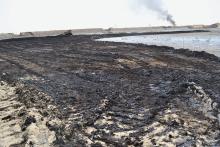Land Library
Bienvenue dans la bibliothèque du Land Portal. Explorez notre vaste collection de ressources en libre accès (plus de 74 000), comprenant des rapports, des articles scientifiques, des articles de recherche, des publications évaluées par des pairs, des documents juridiques, des vidéos et bien plus encore.
/ library resources
Showing items 1 through 9 of 51.The « Environment and Natural Resources Code of Cambodia » (Sixth Draft – – 20 November 2016) is a very extensive proposed law (535 pages !) which will have, if adopted, major impacts on many aspects of Cambodian development (Mines, Energy, Urban planning, etc..) but is particularly important for
Access to land is key to achieving food security, poverty alleviation, social equity and environmental protection. A brief insight in land governance-related principles and policies of the German development assistance.
Fuelwood and charcoal continue to be indispensable in cooking the daily meal for most people in sub-Saharan Africa; in addition, wood as a fuel represents an important source of income.
Is it right to attach financial values to nature and to incorporate that valuation into the post-2015 agenda? Will such valuation help to protect species diversity and ecosystems?
In the debate on climate change, it is frequently argued that the number of “climate refugees” is going to grow world-wide. So far, however, only little evidence has been provided of links between climate change, environmental changes and migration.
If the current trend in global meat demand persists, meat production will need to rise from 300 million tons today to 470 million tons by 2050. Climate and our natural resources would lose out, our author warns.
China has a longstanding tradition of using biogas for decentralised energy supply. Already, there are nearly 42 million household digesters in the rural areas, a figure set to double by 2020. But the country has even more ambitious plans.
German Development Cooperation has developed an approach for the sustainable production of charcoal that has proved to have a considerable impact in Northern Madagascar.
Soils around the world are degrading rapidly, reducing ecosystem diversity and some important functions, threatening food and other human securities, and increasing vulnerability to climate change. This is a vicious cycle created by and leading to further unsustainable land-use practices.








